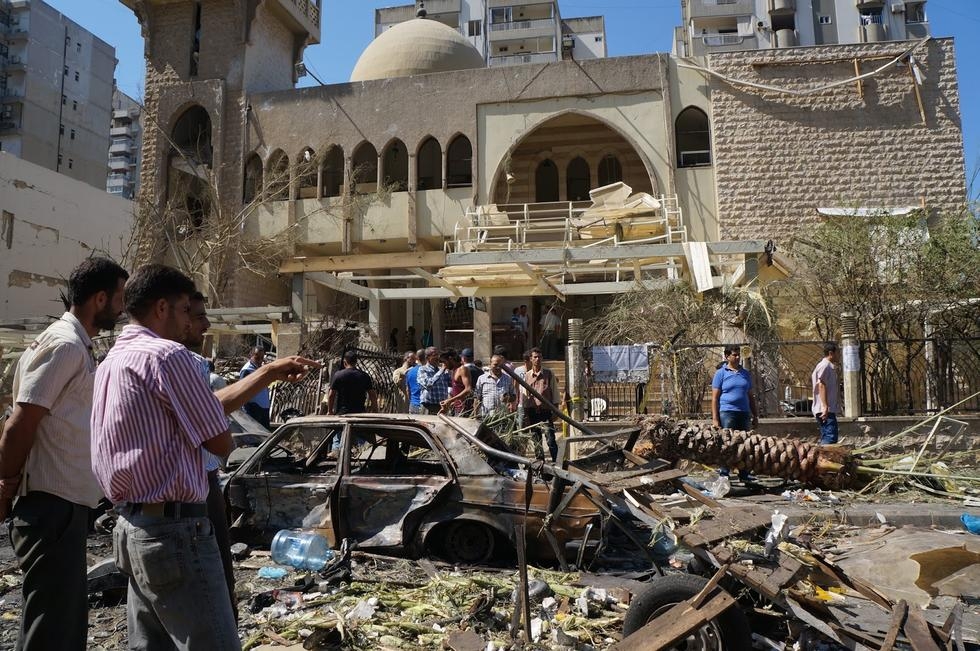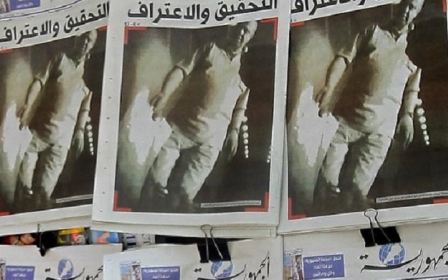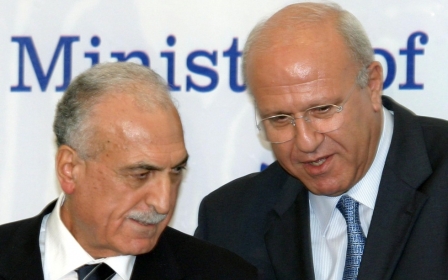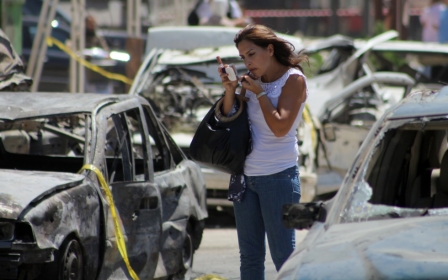Samaha bombing trial exposes rift over Lebanese judicial system

TRIPOLI, Lebanon - News last week that former Lebanese Minister Michel Samaha had been handed a four and a half year sentence by a military court in Beirut was met with shock by politicians and civilians alike in Lebanon.
An ally of embattled Syrian President Bashar al-Assad, Samaha - a former intelligence and tourism minister - was caught in 2012 trafficking explosives into Lebanon from Syria, allegedly for use in terror attacks.
During his trial that began last month, Samaha admitted that he had facilitated an attack to be carried out in the country. However, he insisted that he planned to use the explosives to “avoid sectarian strife,” he said in court.
The explosives, he explained, would be used to set off blasts, forcing Lebanese authorities to close their borders and prevent fighters from joining the largely Sunni opposition.
Initially, Samaha could have faced the death penalty if convicted, but his legal team told MTV news early on in the trial that the death sentence would not be applied.
A little over 24 hours after Samaha’s sentence came down, undercover recordings compiled by Lebanon’s Internal Security Forces between Samaha and an undercover Lebanese intelligence officer were aired on TV and appeared to not only confirm Samaha’s guilt, but also suggest that Assad knew about the planned attacks.
Also in the recordings, Samaha identifies Free Syrian army leaders, gunmen and their sympathisers in northern Lebanon as targets and tells the officer, who was to carry out the apparent attacks, that "collateral damage" was permissible.
In the wake of the recordings and the sentence – most of which Samaha has already served – reaction was strong amongst many Lebanese officials, particularly members of the March 14 Alliance which is opposed to Assad’s continued rule.
Samaha’s sentencing is evidence, they hold, that the Syrian government, through its principal Lebanese ally Hezbollah, continues to exert influence in the country to protect its proxies and weaken its opponents.
Despite the apparent weight of evidence, in a country that has long failed to implement culpability for political assassinations, many maintain doubts that Samaha, eligible for release by the end of the year, has received a sentence appropriate for his crimes.
Push back in Tripoli
Demonstrations against the Samaha verdict have been loudest in Tripoli, a majority Sunni city with a population of 500,000 on the Mediterranean coast, 85km north of Beirut.
Since the start of Syria’s civil war in 2011, Tripoli has witnessed sporadic clashes that have mainly taken place between two deeply impoverished neighbourhoods neglected by the state: Bab al-Tabbaneh, a majority Sunni district, and Jabal Mohsen, a hilltop Alawite enclave controlled by the Arab Democratic Party (ADP), a proxy of the Assad government in Lebanon.
The enmity between the two communities has been shaped by grudges that date back to Syria’s 29-year occupation of Lebanon that ended in 2005.
After Friday prayers last week, hundreds took to the streets in the city in opposition to the Samaha verdict.
Participants notably included Sheikh Salem Rafei, the controversial imam of Tripoli’s Al-Taqwa Mosque and head of the country’s Muslim Scholars Committee, a group of Sunni clerics involved in negotiations to secure the release of Lebanese Armed Forces (LAF) personnel captured by Islamic State and al-Nusra Front gunmen in north-east Lebanon last summer. The committee has accused the LAF of colluding with Hezbollah.
Last year, raids carried out by the LAF focused on Tabbaneh aimed at flushing out suspected Islamic State and al-Nusra Front affiliates, resulted in the arrest of hundreds of locals. Whilst the raids have ended the violence, they have caused resentment and distrust of the LAF and its judicial wing.
On Saturday, after finding out that he was identified as a potential target by Samaha, Khaled Daher - a Sunni MP from north Lebanon accused of Islamic State sympathies - described the country’s military justice system as an institution “specialised in harming and subjugating Sunni youth”.
For his part, Saad Hariri, the more moderate leader of the Sunni Future Movement, dismissed the military court responsible for the Samaha verdict as a “joke.”
‘A lack of balance’
In 2005, Hariri’s father Rafik, a former Prime Minister, was killed in a car bomb that heralded the end of Syria’s 29 year occupation of Lebanon. A UN-sanctioned court, the Special Tribunal for Lebanon, tasked with investigating Hariri’s death and a consequent string of attacks targeting anti-Assad political figures in Lebanon, is currently underway in the Hague.
However, Hariri’s supporters lack confidence in a trial being conducted with most of its suspects in absentia. The Samaha verdict threatens to reinforce a similar lack of faith in the country’s own military justice system.
Utopia, a Tripoli based youth-oriented NGO founded in 2012, works in disaffected neighbourhoods in the city, providing services including employment and conflict resolution workshops, and organising youth-centric cultural and sporting events.
In August 2013, after suicide bomb attacks targeted the Al-Taqwa and As-Salam mosques in Tripoli, Utopia organised a campaign calling on citizens to sign a petition requesting the transferal of jurisdiction over the attacks from a military court to the country’s Judicial Council. Ali Eid, the head of the Arab Democratic Party, headquartered in Jabal Mohsen, and like Samaha, an ally of Assad, has been implicated in the crime.
Although more than 70,000 people signed Utopia’s petition, titled "Shu Ba’dak Natr?" (What Are You Still Waiting For?) and jurisdiction over the case was passed to the country’s Judicial Council, the legal process has stalled as Eid continues to avoid arrest. Whilst rumours spread last year that Eid had fled to Syria to escape a court summons, he was notably spotted at a relative’s funeral in a small village in northern Lebanon earlier this year.
Tripoli native Ashraf Rifi, a Future MP currently serving as Lebanon’s justice minister, was among the first politicians to criticise the Samaha verdict. Shortly after the closure of the case, Rifi, who has been accused of funding militias in Tripoli, said it marked “another black day in the history of the military court” distancing his own ministry from its rulings.
Hezbollah accused
In an interview with Lebanese daily Al-Jamhouria, Rifi said the leniency shown to Samaha demonstrated that Hezbollah, described as “the remnants of the Syrian regime in Lebanon,” was working to undermine the authority of the Lebanese state.
“People here see a lack of balance in the justice system,” said Yahya Harb, Utopia’s project coordinator, standing beside Tabbaneh’s vegetable souq, across the road from an LAF personnel carrier.
“Samaha should face a life sentence, but he could be free before the end of the year. Sunnis that have fought in Syria are arrested by the LAF, but Hezbollah fighters are not.”
Such sentiments were shared by Shafik Abdulrahman, Utopia’s programme manager. Sitting in the organisation’s central office off Tripoli’s Nour Square, Abdulrahman recalled his initial sense of confusion in the aftermath of the August 2013 bombings.
“I remember being in shock looking out of the window,” said Abdulrahman. “There were people running in bare feet, covered in blood. I wondered why they weren’t wearing shoes. Then it dawned on me that mosques had been targeted.
“The best thing for the Samaha case is a retrial. This will show the government is capable of taking control and it will increase confidence in the state.”
Awaiting justice
In the past year, Utopia, whose volunteers include former combatants from Tabbaneh, have made tentative steps towards building bridges between Tabbaneh and Mohsen.
This Saturday, Khaled Shakshir, a local resident who works as a youth councilor for Utopia in the area, has organised a small youth-oriented festival in a car park off Syria Street, the main thoroughfare dividing Tabbaneh from Mohsen. Young people from Mohsen have been invited to take part.
Earlier this year, following a suicide attack on a popular cafe in Mohsen, a group of Utopia staff members and beneficiaries from Tabbaneh visited the site to offer their condolences.
Shakshir expressed a sense of sadness over the Samaha verdict, wary it could undermine civil society initiatives conducted by groups such as Utopia to improve relations between Tabbaneh and Mohsen, and heighten risks of a return to violence between the two communities.
“When people here see that Samaha could get four and a half years and they remember the 2013 bombings,” said Shakshir, “it makes them feel like the rest of Lebanon views them as terrorists.”
“Maybe there will be a retrial, but we are still awaiting justice for Hariri, for Taqwa and Salam, and for many others.”
New MEE newsletter: Jerusalem Dispatch
Sign up to get the latest insights and analysis on Israel-Palestine, alongside Turkey Unpacked and other MEE newsletters
Middle East Eye delivers independent and unrivalled coverage and analysis of the Middle East, North Africa and beyond. To learn more about republishing this content and the associated fees, please fill out this form. More about MEE can be found here.




